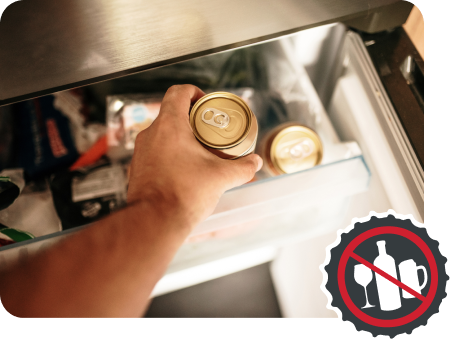STOPPING
EASY ACCESS
77% of high school seniors report alcohol is easy to get, if they wanted some.¹

About half (49%) believe parents can help “demystify” alcohol use by allowing children to experiment safely with drinking at home.
The only thing to “demystify” here is this false impression. While some states do in fact allow parents to serve alcohol to their own children inside their private home, this has the potential to send a mixed message. Parents must make it clear to their teens that underage drinking is unsafe, illegal, and dangerous.

Make sure teens can't access alcohol without your knowledge.
Unmonitored alcohol, including alcohol stored in a cabinet, basement or garage, can be a temptation. When in doubt, lock it up.
Exercise your influence.
50% of U.S. youth, ages 10- to 18-years old, identify their parents as the leading influence, besides themself, in their decisions whether or not to drink alcohol. (Source: Responsibility.org, APCO Insights, February 2025)
Let your teen know that you don’t want them to drink and that most teens (88%) in fact don’t drink. (Source: 2024 Monitoring the Future Study, 2024)
Talk to your teens.
Talk to your teens about how to say no to a drink; role play and have them practice their refusal skills. There are many ways to say NO, so offer them options that fit for their age and personality. Some examples include:
- No, I’ll pass.
- Nope, I’ll go shoot some hoops instead.
- No thanks, that’s not my thing.
- Nah, that’s nothing but trouble.
Discuss ways your teens can get out of situations that might be uncomfortable; try establishing a code word so they know that you need to come get them, no matter where they are or how late it is.
Make sure you know where your teens will be.
Make sure you know where your teens will be—at a friend’s house, at the park, at a sports match—and let them know that drinking alcohol or engaging in other risky behaviors is not acceptable.
Speak out, because silence can be misinterpreted.
It may have happened already. A neighbor announces she is hosting a teen party, but you shouldn't worry — she's taking the car keys from every kid who comes in. Or a colleague says he's serving alcohol to his high school son's friends so they can “learn to drink responsibly.” If you hear about a situation, say that you don’t want other people serving alcohol to your teen or condoning teen drinking. Let your friends, neighbors, and family members know that the minimum drinking age is a policy that protects teens, and that you don’t want your, teen to drink.
Take action before a situation arises.
Start talking to the parents of your teen's friends early — for example, when your kid is in 6th grade. Tell them about the risks of teen drinking and let them know that you don’t want anyone to allow your teen to drink alcohol.
Talk to adults who host teen parties.
Let them know that the overwhelming majority of parents support the legal drinking age and 92% say it is not acceptable for another parent or adult to serve alcohol to their child or someone else's teen — and not okay to turn a blind eye to teens' alcohol consumption (Responsibility.org, AmeriSpeaks Omnibus, 12/2019). Encourage them to learn about social hosting laws and consequences for serving alcohol to people under the legal drinking age.
Talk to your school board, school principals, teachers, and coaches.
Let them know that it is unsafe, illegal, and irresponsible to condone teen drinking. Ask them to discourage this activity and to send reminder before events such as homecoming, prom, and graduation.
Talk to management at restaurants, town halls, and other venues where teen parties are held.
Let them know that parents in your community do not want teens to have access to alcohol.
Talk to local law enforcement.
Let local law enforcement know that you encourage active policing of noisy teen parties that may signal alcohol use.
Tell local alcohol retailers that you want them to check ID before selling alcohol.
Limiting alcohol sales to legal purchasers is an important goal and worth the time it takes. 80% of American adults believe the most effective way to demonstrate their commitment to not selling or serving alcohol to those under the age of 21 is by always checking ID.
(Responsibility.org, CARAVAN Omnibus, 8/22)
Underage drinking and your college student
Alcohol consumption and college students
According to the 2021 Monitoring the Future Panel Study, alcohol consumption among college students has been level in recent years for the most part. In 2020, alcohol prevalence rates of 30-day use, 30-day been drunk, and binge drinking declined significantly in the early stages of the pandemic, but have rebounded from these historic lows in 2021.
Overall, the prevalence of college drinking over the past 30 years, measured as lifetime, annual, and past 30-day consumption rates continue to trend downward. Since 1991, lifetime consumption among college students has declined 15% proportionately, while annual consumption and monthly consumption are down 13% and 20%, respectively.
College drinking impacts everyone
According to the National Institute on Alcohol Abuse and Alcoholism, the first six weeks of a student’s first year in college are a vulnerable time for harmful and underage college drinking and alcohol-related consequences because of student expectations and social pressures at the start of the academic year. College drinking not only impacts the drinking student, but also those around them even if they choose not to drink.
Addressing low risk drinking with college students
For Parents: More information is available via Responsibility.org’s “Parents You’re Not Done Yet” and The Substance Abuse and Mental Health Services Administration’s “Talk, They Hear You” campaigns.
For Colleges: The Alcohol 101+ program provides students with the knowledge to make smarter decisions relating to alcohol.
Use the campaign materials available below to help us keep alcohol out of kids’ hands.
Don’t serve teens.
IT’S UNSAFE. IT’S ILLEGAL. IT’S IRRESPONSIBLE.